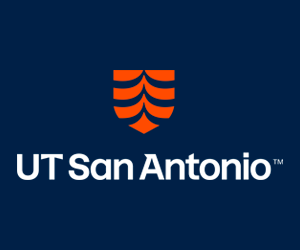Why Pursue a Master's Degree in Educational Leadership
During the last semester of the program, our Educational Leadership students attend two free workshops to help them prepare for the TExES State Principal Exam and take a free practice TExES exam. These workshops are one of the reasons that our students have such a high passing rate for the state exam. Additionally, our faculty have close connections and works closely with local school districts, superintendents and principals, and our graduates hold positions ranging from assistant principal to superintendent in greater Bexar County school districts.
Optional Hybrid Online Format
Students have the option to pursue the Educational Leadership (MEd) either through the traditional on-campus format or a flexible hybrid online format. The hybrid online option allows students to complete coursework online while still benefiting from valuable campus resources. It’s the perfect blend of convenience and connection—ideal for working professionals or anyone balancing school with a busy life.
Online Course Delivery
All courses are delivered online either asynchronously or synchronously, with access to interact with faculty and classmates.
Required Campus Experience
As part of the Required Campus Experience for the MEd in Educational Leadership (K–12), students must complete EDL 6943: Practicum in Educational Administration (repeated for 6 credit hours). This supervised field experience provides hands-on engagement with campus or district-level administrators, supporting leadership skill development through applied research and problem-solving. The practicum bridges theory and practice, helping students build their professional identity and meet Texas Principal certification requirements (if applicable).
When applying to the Educational Leadership (MEd), you will be asked to select your preferred format: “Hybrid Online” or “Traditional”.
See What Our Students Say
When you choose UT San Antonio, you join a community of talented students being taught by award-winning faculty. See what our students have to say.
Admission & Application Requirements
Applications are submitted through the UT San Antonio Graduate Application. Please upload all required documents (listed below) on your UT San Antonio Graduate Application. It is the applicant’s responsibility to ensure completion and submission of the application, a nonrefundable application fee, and all required supporting documents are on file with UT San Antonio by the appropriate application deadline.
| Educational Leadership (MEd) | ||
|---|---|---|
| Required Degree | Bachelor's Degree from an accredited college or university in the United States or have proof of equivalent training at a foreign institution. | |
| Minimum GPA | 3.0 (on a 4.0 scale) Departments may consider GPA of last 60 semester credit hours | |
| Coursework | Completed adequate credit hours or foreign institution equivalent coursework as preparation for the program. | |
| Transcripts* | Required from all institutions attended; international transcripts must be recorded/translated to English | |
| Credential Evaluation | Required if you have earned university-level credit from foreign institutions. Submit an evaluation of your transcripts from FCSA or any NACES-approved credential evaluation agency. | |
| English Language Proficiency | 79 TOEFL iBT / 6.5 IELTS / Duolingo 100 For exams taken on or after January 21, 2026: We require a minimum TOEFL iBT score of 4.0. |
|
| Purpose Statement | Required | |
| Resume | Required | |
| *Unofficial transcripts will be taken into consideration for admissions; however, if admitted into the program, you must submit official transcripts to the University. | ||
Application Deadlines
Applicants are encouraged to have their admission file completed as early as possible. All applications, required documents and letters of recommendation, if applicable, must be submitted by 5:00 PM U.S. Central Time on the day of the deadline. Deadlines are subject to change.
| Educational Leadership (MEd) | |||
|---|---|---|---|
| Timing on Admission Decision: Completed applications will be reviewed for admission on a rolling basis. Decisions generally will be made and sent to applicants within 4 to 6 weeks of receiving the application. | |||
| Application Deadlines for: | Priority | International | Domestic |
| Spring 2026 | November 1 | December 15 | |
| Summer 2026 | Not Available | Not Available | |
| Fall 2026 | June 1 | August 1 | |
| Spring 2027 | November 1 | December 1 | |
| Summer 2027 | Not Available | Not Available | |
Funding Opportunities
ResourcesCareer Options
UT San Antonio prepares you for future careers that are in demand. The possible careers below are based on data pulled by a third-party tool called Emsi, which pulls information from sources like the U.S. Bureau of Labor Statistics, U.S. Census Bureau, online job postings, other government databases and more to give you regional and national career outlook related to this academic program.
In the Spotlight
We understand that many of our graduate students work full time. All of our courses run from 6 PM to 8:45 PM Monday through Thursday during the Fall and Spring Semesters. During the Summer Semester, our courses run throughout the day as many of our students are teachers and work less in the summer.
- Emphasis in educational leadership for K-12 school administrators (meets principal certification requirements)
- Emphasis in educational policy and advocacy
- Emphasis in teacher leadership
Our students and faculty use a variety of research methods: quantitative, ethnographic, discourse analysis, and mixed methods. Students are engaged in studying topics like servant leadership, administrator burnout, high school social processes including organizational climate, trust, collective efficacy, principal influence, and its relationship to school achievement, induction program for new teachers, what successful new teachers do to stay in the profession, issues of education law and policy, along with program evaluations of specific programs.
Students gain extensive theoretical knowledge of educational practices and emerging paradigms of organizational leadership. The curriculum emphasizes coursework designed to develop, analyze and evaluate educational programs, school personnel, and effective system practices.

Graduate Advisor of Record
Mariela Rodriguez, PhD
210-458-5436


